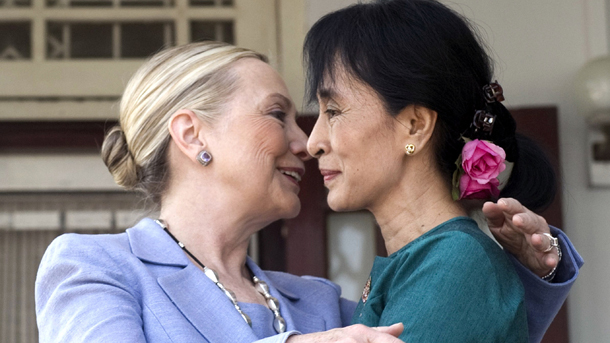WASHINGTON D.C.—US Secretary of State Hillary Clinton called Aung San Suu Kyi to discuss easing trade restrictions on Sunday evening just as a key lawmaker introduced a bill in the House of Representatives to renew sanctions on Burma.
Taking time off from her hectic schedule in Chicago, venue of the NATO Summit, Clinton called the Burmese opposition leader to brief her on the just-concluded G-8 meeting in Camp David.
“They talked about the need for specific steps to promote responsible, transparent investment, empower reformers, and target abusers,” the State Department in a statement, a day after the two leaders spoke to each other by phone.
Clinton and Suu Kyi, the statement said, agreed that the important progress of the past several months remains fragile and that the international community needs to help protect against backsliding.
“In this regard, the secretary assured Aung San Suu Kyi that the United States is keeping its sanctions authorities in place as an insurance policy,” the State Department said, adding that the two leaders also discussed the urgent need for progress in resolving ethnic conflicts and ending human rights abuses in minority areas.
Meanwhile, Congressman Joe Crowley announced that he has reintroduced legislation to renew sanctions on Burma’s military regime. House Joint Resolution 109 would continue the ban on all imports from Burma as part of the Burmese Freedom and Democracy Act.
“While we have seen many signs of progress in Burma, there is still much more to be done. Too many political prisoners are still in prison, violence continues against ethnic minorities, and not all necessary political reforms have been put in place,” Crowley said.
“At this pivotal moment, it’s vitally important the US carefully balances its efforts to recognize the political changes we’ve seen take place in Burma with a consistent message that far more progress is needed.
“That’s why it is critical we keep this legislation in place and to continue to push for change. The US has been right to respond in some way to the political changes we’ve seen in Burma, but now is not the time to lift all sanctions,” he added.
Each year, Congress must vote to renew sanctions on Burma as part of the Burmese Freedom and Democracy Act. Signed into law in 2003, the legislation strengthened existing American sanctions by banning imports from Burma, officially known as Myanmar.
In January 2012, Crowley became the first member of the US House of Representatives to officially travel to Burma in over 12 years. In addition to authoring legislation to renew the ban on all imports from Burma contained in the Burmese Freedom and Democracy Act, Crowley also spearheaded the effort to strengthen sanctions on Burma’s military leaders through the Block Burmese JADE Act and led the successful effort to award Suu Kyi the Congressional Gold Medal.
Meanwhile, Suu Kyi will receive an honorary degree from prestigious Johns Hopkins University later this week, it was announced on Monday.
Although the Nobel Laureate, one of six accomplished leaders who will be awarded honorary degrees, will not attend the university-wide commencement ceremony for graduates on May 24, she will be given her citation in absentia.
“As the on-the-ground leader of Burma’s democracy movement, Suu Kyi has devoted much of her life to nonviolent opposition to an oppressive military junta,” the university said. “She spent most of the years between 1990 and 2010 under house arrest for fighting for her beliefs.”
Despite her incarceration, Suu Kyi kept the world’s attention and energy focused on her people’s plight, claims the university. The 66-year-old led her National League for Democracy to a majority in Parliament in 1990, an election that the military refused to recognize, and in 1991 she was awarded the Nobel Peace Prize “for her nonviolent struggle for democracy and human rights.”
Since her release, Suu Kyi has resumed an influential role in public life, extracting important concessions from the government, the university said, adding that last month she and more than 40 others in her party were elected in a landslide to Burma’s Parliament. This time, the government recognized the victory, it noted.
Meanwhile, Suu Kyi will finally get the chance to deliver her acceptance speech for the Nobel Peace Prize, nearly 21 years after winning the prestigious award, at Oslo’s City Hall on June 16. The Oxford University graduate is also due to address the UK Parliament next month in her first visit to the country in 24 years.

















